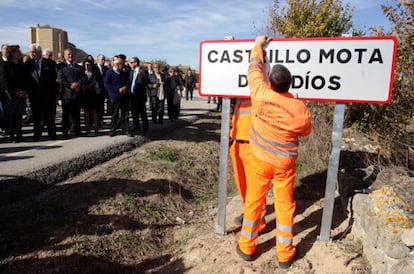New signs go up in Burgos hamlet with offensive “Kill Jews” name
Town switches Castrillo Matajudíos for Castrillo Mota de Judíos 17 months after vote


A year-and-a-half after they took a vote on it, the residents of Castrillo Matajudios (which literally means “Little Hill-Fort of Jew Killers”) officially changed the name of their Burgos village on Friday from the offensive designation.
The 60 residents celebrated the final end of the government paper work, which officially changes the name of their hamlet to Castrillo Mota de Judíos, which now means “Little Hill-Fort on Jew Hill.”
A spelling mistake in a 1623 document is thought to have given the town the name Castrillo Matajudíos
Although the regional Castilla y León government’s gazette published the name change in June, it was only on Friday that the municipality came up with a new official seal and workers finally put up new signs outside the village’s limits.
“We are living a historic moment,” said one town official.
Among those on hand for the name-changing ceremony were Israel’s ambassador to Spain, Daniel Kutner, as well as representatives of Spain’s Jewish and Sephardic Jewish communities.
The village gained global notoriety after it announced that it would hold a referendum in May 2014 on the same day of the European elections.
Of the 56 residents with the right to vote, 52 turned out: 29 supported the name change while 19 voted against the proposal.
The inhabitants also decided to select a new name: three supported Castrillo Motajudíos while 26 voted in favor of Castrillo Mota de Judíos.
Mayor Lorenzo Rodríguez said that the village had originally been named either Castrillo Motajudíos or Castrillo Mota de Judíos, but a registrar in 1623 made a spelling mistake in an official document and the named remained Castrillo Matajudíos for five centuries.
“More than one person was offended by the name,” the mayor said.
In Israel, the town’s original name was considered “antisemitic.”
Municipal officials now want to undertake excavations in La Mota where past digs have shown remains of a Sephardic community that was located there between the 11th and 15th centuries. The government is also planning to build a local Sephardic community center.
English version by Martin Delfín.
Tu suscripción se está usando en otro dispositivo
¿Quieres añadir otro usuario a tu suscripción?
Si continúas leyendo en este dispositivo, no se podrá leer en el otro.
FlechaTu suscripción se está usando en otro dispositivo y solo puedes acceder a EL PAÍS desde un dispositivo a la vez.
Si quieres compartir tu cuenta, cambia tu suscripción a la modalidad Premium, así podrás añadir otro usuario. Cada uno accederá con su propia cuenta de email, lo que os permitirá personalizar vuestra experiencia en EL PAÍS.
¿Tienes una suscripción de empresa? Accede aquí para contratar más cuentas.
En el caso de no saber quién está usando tu cuenta, te recomendamos cambiar tu contraseña aquí.
Si decides continuar compartiendo tu cuenta, este mensaje se mostrará en tu dispositivo y en el de la otra persona que está usando tu cuenta de forma indefinida, afectando a tu experiencia de lectura. Puedes consultar aquí los términos y condiciones de la suscripción digital.








































